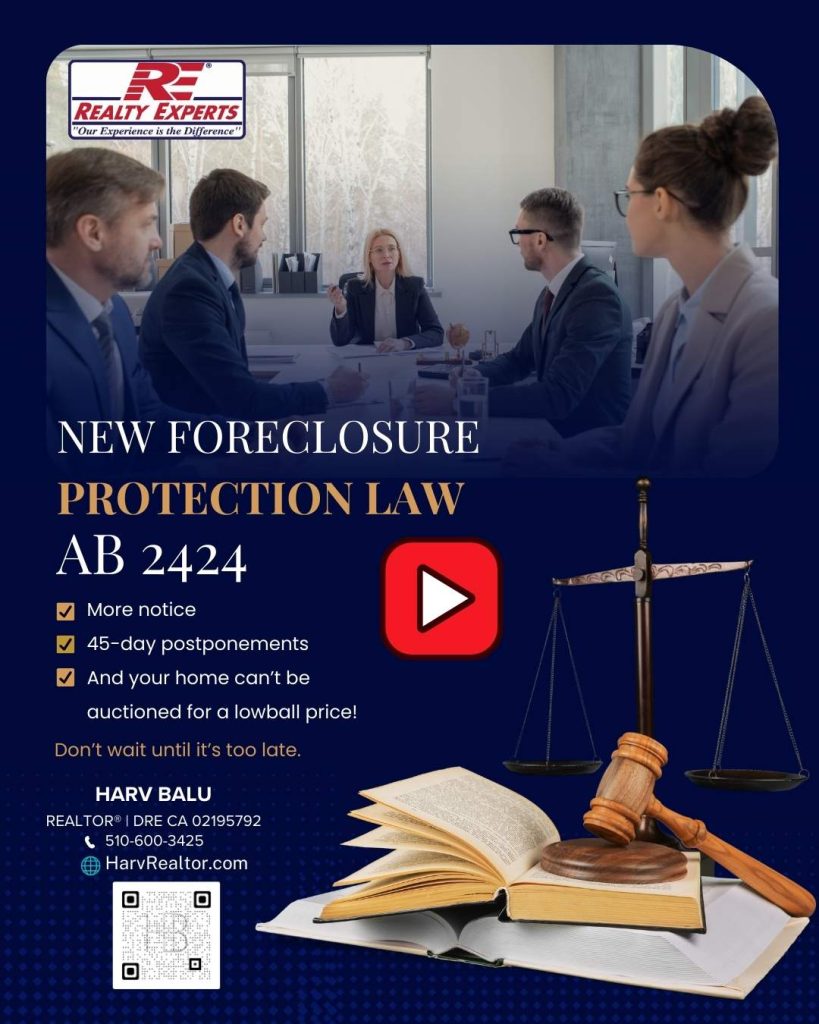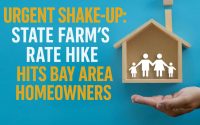California New Foreclosure Protection Law (AB 2424): What Bay Area Homeowners Need to Know

Foreclosure can be scary and overwhelming, especially here in the Bay Area where our homes mean so much to us. The good news is that California has rolled out a new foreclosure protection law to give homeowners more breathing room and fairness in the process. This law, known as Assembly Bill 2424 (AB 2424), went into effect on January 1, 2025. In this post, I’ll explain what AB 2424 is and why it matters for Bay Area homeowners. As a Bay Area Realtor, I’ve seen firsthand how stressful foreclosure can be, and I want you to know you have new rights and options to protect your home. Let’s break down the key points in easy-to-understand terms.
What is AB 2424 and Why Is It Important?
AB 2424 is California’s new foreclosure protection law aimed at helping homeowners avoid foreclosure or minimize its impact. In simple terms, it strengthens the rules so lenders have to give you more opportunities and information before taking your home. This is especially important in high-cost areas like the Bay Area, where losing a home to foreclosure could mean losing a lot of hard-earned equity. The law’s homeowner protections (effective in 2025) ensure you get fair treatment, more time to find solutions, and a better chance at keeping or selling your home on your terms.
If you’re searching for Bay Area foreclosure help, or wondering how to navigate a possible foreclosure, understanding AB 2424 is a great first step. Let’s dive into the key protections this law provides.
Key Protections Under California AB 2424 Foreclosure Law
AB 2424 introduces several major protections for homeowners in the foreclosure process. Here are the key provisions you should know about, in plain English:
Early Loss Mitigation Communication: Lenders must reach out early (usually after a missed payment) to discuss loss mitigation options. This means if you fall behind, the bank has to proactively contact you to explore ways to avoid foreclosure – whether through a payment plan, loan modification, or other alternatives. You get every opportunity to catch up or find a solution before things escalate.
Third-Party Notification Rights: You can designate a trusted third party – like a family member, attorney, or HUD-approved housing counselor – to receive foreclosure notices on your behalf. Why is this helpful? Because having someone else in the loop means extra support. If you’re overwhelmed or miss a letter, your designated helper (say, an adult child or a counselor) will also get the notices and can assist you in responding. It’s a safety net so you don’t go through foreclosure alone.
Foreclosure Sale Postponement (When You’re Selling): One of the most powerful new protections: if you’re in foreclosure but manage to list your home for sale, the law can pause the auction. Specifically, if you provide a valid listing agreement at least 5 business days before the foreclosure sale date, the sale must be postponed for 45 days. This gives you more time to try to sell the property on the open market and pay off the loan. Even better, if you actually get an accepted purchase offer (a signed purchase agreement) during that postponement period, the sale gets delayed further to allow the transaction to close. In short, AB 2424 gives you time to sell your home and avoid the foreclosure auction – a crucial lifeline for homeowners looking for a dignified way out.
Fair Market Value Protections: Another big win for homeowners – your home can’t be sold at the foreclosure auction for a dirt-cheap price (at least not initially). The new law requires the lender or trustee to obtain a fair market value assessment of the property at least 10 days before the auction. When the foreclosure auction happens, the opening bid must be at least 67% of that assessed fair market value. This means no more homes getting sold for pennies on the dollar in the first auction. It helps protect your equity. If nobody is willing to bid at least 67% of the value, the sale would likely be postponed or other steps taken, rather than you losing the home for far below what it’s worth. This provision is all about fairness and preserving your home’s value.
Together, these protections form a strong safety net. They encourage communication and give you, the homeowner, more control and time. Next, let’s look at the foreclosure timeline in California and see where these protections fit in.
A Simplified Foreclosure Timeline in California
Understanding the foreclosure timeline can help you know what to expect and how AB 2424 fits into each stage. Here’s a simplified step-by-step timeline for California:
Missed Payments (Days 1–90): The process starts when you miss mortgage payments. After your first missed payment (Day 1), you’re technically in default, but lenders usually won’t jump to foreclose immediately. By around Day 36 (about 5 weeks late), the lender is now required (under AB 2424) to call or contact you to discuss options for avoiding foreclosure. They might talk to you about repayment plans, forbearance, or loan modifications – this is that early loss mitigation communication. By Day 45, if you’re still behind, the lender must send you a written Notice of Foreclosure Alternatives. This is basically a letter outlining ways you can avoid foreclosure (like refinancing, assistance programs, etc.). You typically have about 90 days from the first missed payment before the lender takes the next legal step.
Notice of Default (Around 90 Days Late): After roughly three months of missed payments, the lender can record a Notice of Default (NOD) with the county. The NOD is an official document that starts the formal foreclosure process. Once a Notice of Default is filed, you usually have at least another 90 days to “cure” the default by catching up on payments or coming to an arrangement. During this period, you’re in what’s called pre-foreclosure. (This is a critical time to seek help – many solutions like loan modification or selling the home are still on the table.)
Notice of Trustee’s Sale (After the 90-day NOD period): If you haven’t resolved the default after those 90 days following the NOD, the lender can then issue a Notice of Trustee’s Sale (NOTS). This notice sets an auction date for your property. The sale date has to be at least 21 days after the notice is posted. You’ll typically see a notice pinned to your property or mailed, and it will have the date, time, and location of the foreclosure auction. Here’s where AB 2424’s new postponement rules kick in: If you can show the trustee a valid listing agreement for selling your home at least 5 business days before this scheduled sale, the trustee must postpone the sale by 45 days. That’s an extra month and a half for you to find a buyer. And remember, if during that 45-day extension you get a purchase agreement (i.e. you enter escrow with a buyer), the sale gets postponed again to give time for the sale to close.
Foreclosure Sale/Auction (Earliest ~111+ days after NOD): If no postponements or resolutions occur, the home will be sold at a foreclosure auction to the highest bidder (or it may revert to the lender). The earliest this auction can happen in California is roughly 111 days after the NOD was recorded (that’s the 90-day default period + 21-day notice period, assuming no delays). Thanks to AB 2424’s fair market value protection, the auction cannot sell your home for less than 67% of its fair market value (based on that assessment done beforehand). This ensures the home isn’t sold for an unreasonably low price on the first go. If the auction doesn’t meet that minimum price, further steps will be taken (often the lender takes the property back and may re-attempt sale later). Also, if you had a buyer lined up and submitted a purchase agreement during that earlier 45-day postponement, the auction would have been delayed further to allow your sale to close, as noted above.
Post-Foreclosure (Eviction Process): If the home does sell at auction (or the bank takes ownership), you’ll have to vacate the property. The new owner (or bank) can begin the eviction process if you don’t leave voluntarily. Important: Even here, you have rights – the new owner must follow legal eviction procedures, and you may negotiate move-out timing or relocation assistance in some cases. Hopefully, with the new law’s protections, fewer homeowners will get to this stage because they’ll have found a solution earlier in the timeline.
This timeline might seem a bit technical, but the big takeaway is that foreclosure isn’t instantaneous. There are multiple stages and plenty of opportunities to get help or take action, especially now with AB 2424 adding more time and options in the mix.
Who Do These Protections Apply To?
AB 2424’s new rules apply to most residential homeowners in California, but there are a few qualifiers to know. The law covers loans on one-to-four unit residential properties (so single-family homes, condos, townhomes, and small multi-unit buildings up to four units). Many provisions – like the postponements and fair value rule – are primarily aimed at first mortgage loans (the main loan on your home) and for properties that are owner-occupied (your primary residence). In plain language, if you live in your home and it’s your primary mortgage, AB 2424’s protections have you covered. (If you’re an investor or the loan is secondary, some of these specific protections might not apply fully.)
For most Bay Area homeowners worried about foreclosure, you’ll likely qualify for these protections. It’s one more reason to feel a bit more at ease – the law is on your side.
As a Bay Area real estate agent who has guided clients through difficult situations, I want you to know you’re not alone. Navigating foreclosure can be complex, but with these new AB 2424 protections, we have more tools than ever to help you. Here’s how I can assist:
Expert Guidance: I’ll help you understand your options at every stage of the process. Whether it’s exploring a loan modification, listing your home for sale to take advantage of that 45-day postponement, or considering a short sale, I’ll lay out the pros and cons in plain English. My goal is to empower you to make the best decision for your situation.
Leverage the New Law: Because I stay up-to-date on California AB 2424 foreclosure law, I can make sure we use every protection available. For example, if selling is the right path, I’ll work quickly with you to get your home on the market so we can trigger the 45-day auction delay. I’ll also coordinate with the foreclosure trustee to ensure they have the necessary documentation of your listing or purchase offer. In other words, I’ll help you work the timeline in your favor.
Fair Market Value and Pricing: With the new fair market value rule, it’s more important than ever to know your home’s true value. I can provide a professional market analysis of your property so you know what 100% (and 67%) of your home’s value really is. This knowledge helps in negotiations with the bank and in setting a competitive listing price if we decide to sell. The Bay Area real estate market has its nuances, and I’ll make sure you’re not short-changed.
Network of Support: Over the years, I’ve built relationships with housing counselors, attorneys, and lenders in the Bay Area. If you need legal advice, credit counseling, or other help beyond real estate services, I can connect you with trustworthy professionals. Remember that third-party notification right? I can help you find a qualified counselor or attorney to be that extra set of eyes, ensuring you never miss an important notice.
Above all, my approach is compassionate and confidential. I understand that facing foreclosure can be emotionally draining. My promise is to stand by your side and work hard to find a solution – whether that’s saving your home or helping you move on in the best shape possible. My mission as your Bay Area real estate agent is not just to buy and sell houses, but to help people. And that includes helping you navigate challenges like foreclosure with dignity and hope.
Bay Area Foreclosure Help: Don’t Face It Alone – Reach Out Today
You are not alone if you’re worried about foreclosure. Many homeowners are in the same boat, and now with AB 2424’s protections, you have more hope and more time. The most important step you can take is to reach out for help sooner rather than later. As your local Realtor and neighbor, I invite you to contact me for a friendly, no-judgment consultation. We can chat about your situation, go over your options under the new law, and come up with a plan that makes sense for you.
Please feel free to call, email, or visit HarvRealtor.com to get in touch with me (Harv Balu). Even if you’re just exploring what to do next, I’m happy to listen and offer guidance. Foreclosure is not a journey you have to go through alone. With the right information and a caring professional by your side, you can navigate this challenge and come out the other side.
Remember: There are new homeowner protections in California as of 2025 designed to give you a fighting chance. I’m here to make sure you know how to use them. Let’s work together to protect your home and your future. Reach out today – I’m ready to help you find the best path forward.
You’ve got allies in your corner, and I’m one of them. Hang in there, and let’s talk.
Find Your Perfect Property: https://HarvRealtor.com
Alameda County : Latest Inventory & Updates:
https://Harvinder.dscloud.me/blog/reports-by-cities/alameda-county/
In-Depth Alameda County Real Estate Inventory (interactive):
https://Harvinder.dscloud.me/blog/alameda-real-estate-interactive/
Santa Clara County : Latest Inventory & Updates:
https://Harvinder.dscloud.me/blog/reports-by-cities/santa-clara-inventory/
Link for this post:
https://harvinder.dscloud.me/blog/05/21/2025/foreclosure-law-ab-2424/
Disclaimer: This article is for general informational and educational purposes only. It is not intended to provide legal advice, tax advice, financial advice, or professional guidance of any kind. Readers should not rely solely on the information presented here when making decisions. Laws and regulations may change and individual situations vary. Always consult with a qualified attorney, tax professional, or financial advisor before taking any action related to the topics discussed.
Related Posts

Exploring European Real Estate Trends: A Guide for International Investors – CIPS

Critical Update: How State Farm’s Emergency Rate Hike Could Impact Your Bay Area Home
First Time Buyer Specialist (FTBS) 2 – Notes
About The Author
Harv
HarvRealtor.com | Harv Balu, CIPS, GRI, FTBS, PSA | Tech-savvy Realtor & proud father of 3, committed to seamless real estate journeys. With 15+yrs in IT & passion for real estate, I offer tailored services. Enthusiast photographer, green-thumbed gardener.
Add a Comment
Cancel reply
This site uses Akismet to reduce spam. Learn how your comment data is processed.
